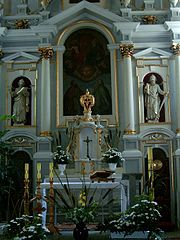
A History Of The Mass And Its Ceremonies In The Eastern And Western Church -Rev John O'Brien A.M.
THE SECOND PRAYER OF THE CANON, OR THE MEMENTO FOR THE LIVING
As the priest begins this prayer he moves his hands slowly before his face, and, having united them, rests in meditation awhile, pausing over those for whom he intends to pray particularly. He is at liberty to remember here—privately, of course—whomsoever he pleases, no matter whether he be in the Church or out of it; for the prayer is private, and the Church exercises no jurisdiction over private prayers. This memento is worded as follows: “Remember, O Lord, thy servants, male and female, N. N. [pause], and all here present, whose faith is known to thee and devotion manifest; for whom we offer, or who offer to thee, this sacrifice of praise, for themselves and all that belong to them, for the redemption of their souls, for the hope of their salvation and safety, and who render their vows to thee, the Eternal, Living, and True God.”
Regarding the expression, “who offer to thee,” as applied to the people, the reader must not suppose that the right or power of offering sacrifice in the true sense is meant, for the people cannot do this, but only the priest. The expression is a familiar form for signifying co-operation in the sacred mystery, and directly refers to the ancient practice of receiving offerings from the people in the shape of bread and wine for altar purposes. According to Romsee (p. 187), the particle “or” in this prayer must be considered a copulative conjunction, and not a disjunctive one; and that hence the wording in its true sense would be, “for whom we offer, and who offer unto thee,” etc. Regarding the word “vota,” translated by us as vows, it is well to remark that what are technically called by that name, whether they be simple vows or solemn ones, are here meant only in a very remote sense; the direct application of the word is to be taken in the sense of pious desires, thanksgivings, and private intentions (Romsee, p. 189).
Formerly it was customary to read aloud at the letters “N. N.” of this memento the names of all those who were entitled to special mention. In Solemn High Mass the duty of doing this devolved upon the deacon, who would stand for this purpose on the altar-steps, or ascend the ambo, which was the more general way; but in Low Mass the duty devolved upon the priest, who turned round to the congregation at this place, and read the names from folded tablets called diptychs. According to the general opinion of liturgists, this custom lasted, with little interruption, up to the eleventh century, when, on account of the excessive vainglory that many indulged in at hearing their names and offerings read out in public, the Church thought well to discontinue it (Romsee, p. 185).
Copyright ©1999-2023 Wildfire Fellowship, Inc all rights reserved

 Keep Site Running
Keep Site Running